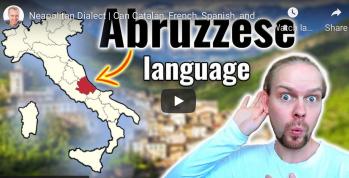 This great video will repay your close attention!
This great video will repay your close attention!
And it does demand close attention. Also, you should definitely turn on closed captioning, unless you happen to be fluent in Catalan, French, Latin, and Spanish. And of course you’ll be listening to Abruzzese as well; that’s the whole point. It’s really hard to concentrate on listening to five languages in succession, plus reading the Abruzzese text, plus reading the closed captions all at once! But frequent pausing will help. It will be worth it.
Three questions to comment on here:
- What is Abruzzese?
- How well can speakers of one Romance language understand another Romance language?
- Is there really such a thing as spoken Latin anymore?
OK, first of all, the title to this post asks the relevant questions about Abruzzese, a Romance language you’ve probably never heard of. The map in the image above (taken from the video, as you can readily deduce) shows where Abruzzese is spoken. Until I was in my 30s I had never known that there are many languages in Italy in addition to standard Italian. When I listened to people from Venice, and couldn’t understand a word, I just assumed that they were speaking an Italian dialect with a difficult accent; little did I know that they were speaking Veneziano, a separate (though related) language. In the wonderful novels of Donna Leon you will meet Venetian natives who readily code-switch between Italian and Veneziano. Likewise, Neapolitan is a distinct language, spoken in Naples and environs of course, and it turns out that Abruzzese is a dialect of Neapolitan spoken in Abruzzi.
Got it?
So here’s the second question. If Abruzzese is a dialect of Neapolitan, which is a Romance language similar to but distinct from Italian, how well can speakers of some other Romance languages understand it? The video shows four speakers (of Catalan, French, Latin, and Spanish respectively) participating in an experiment by listening to a speaker of Abruzzese. If you speak any of those languages—or any other Romance language, for that matter—try the experiment yourself by watching the video and pausing whenever you need to. Remember to turn on closed captioning, as I said up above.
My third question is about Latin, which happened to be the first foreign language I learned—back in the Dark Ages of seventh grade. Of course we all knew that we could learn to read and write Latin, but we also knew that no one ever speaks it.
Wrong!
Aside from the fact that the Pope and other residents of Vatican City do speak Latin, I took a course in college called “Latin composition,” in which we had to write essays in Latin, read them aloud to the class, listen very closely, and then critique the essays! Fortunately the critiquing was in English, but the course itself was still really difficult—not so much the composition but the listening. Almost nobody teaches Latin that way. One exception is Luke Ranieri, who does teach Latin conversation and is the amazing Latin speaker in the video! If you’ve studied Latin, you will marvel at his off-the-cuff questions and comments.
OK, now go watch the video. This is Part One:
Categories: Linguistics